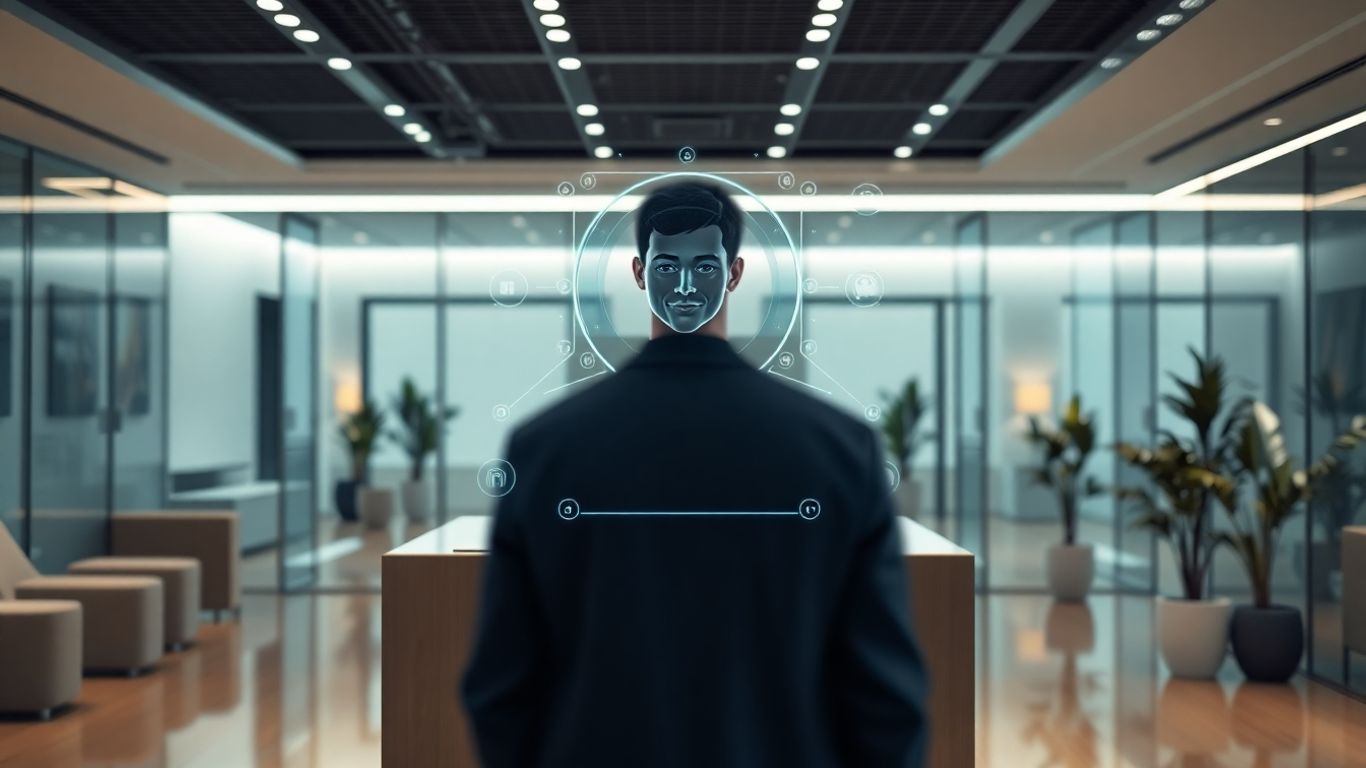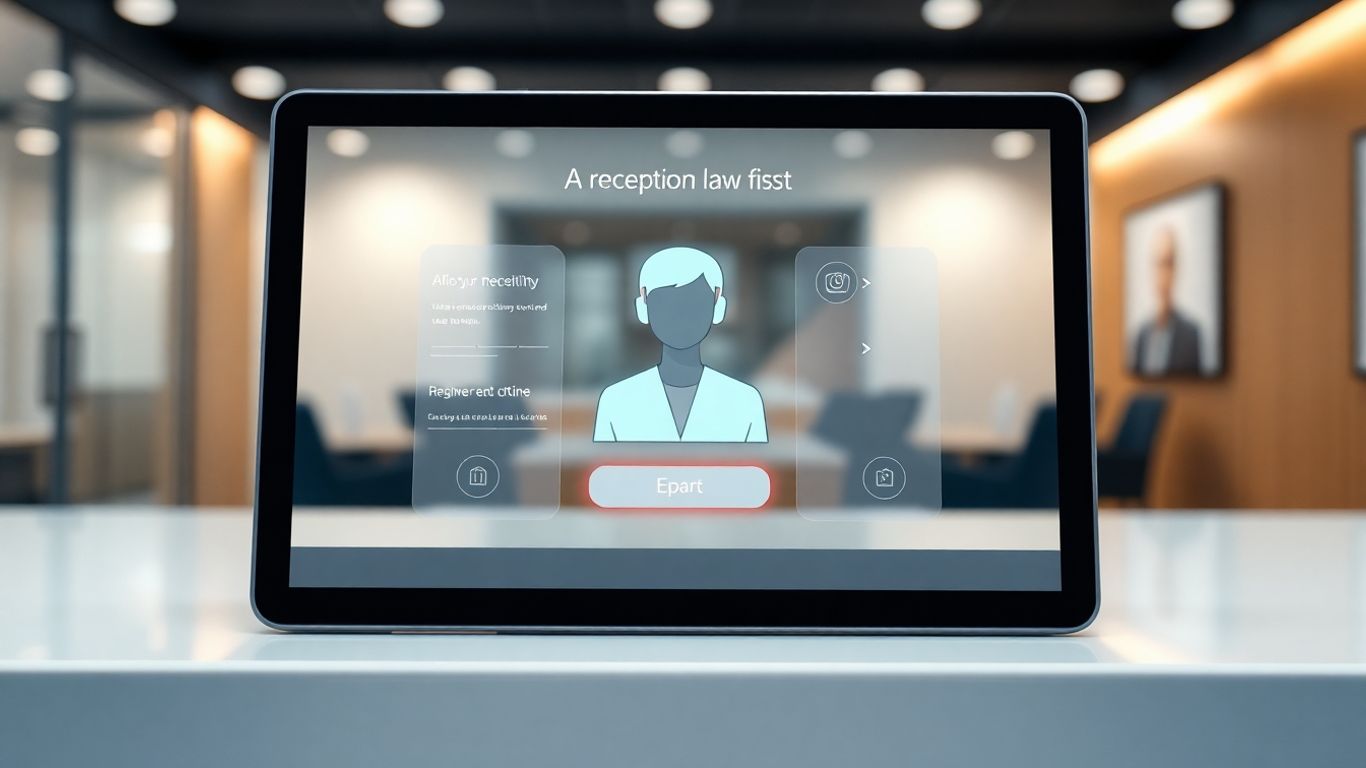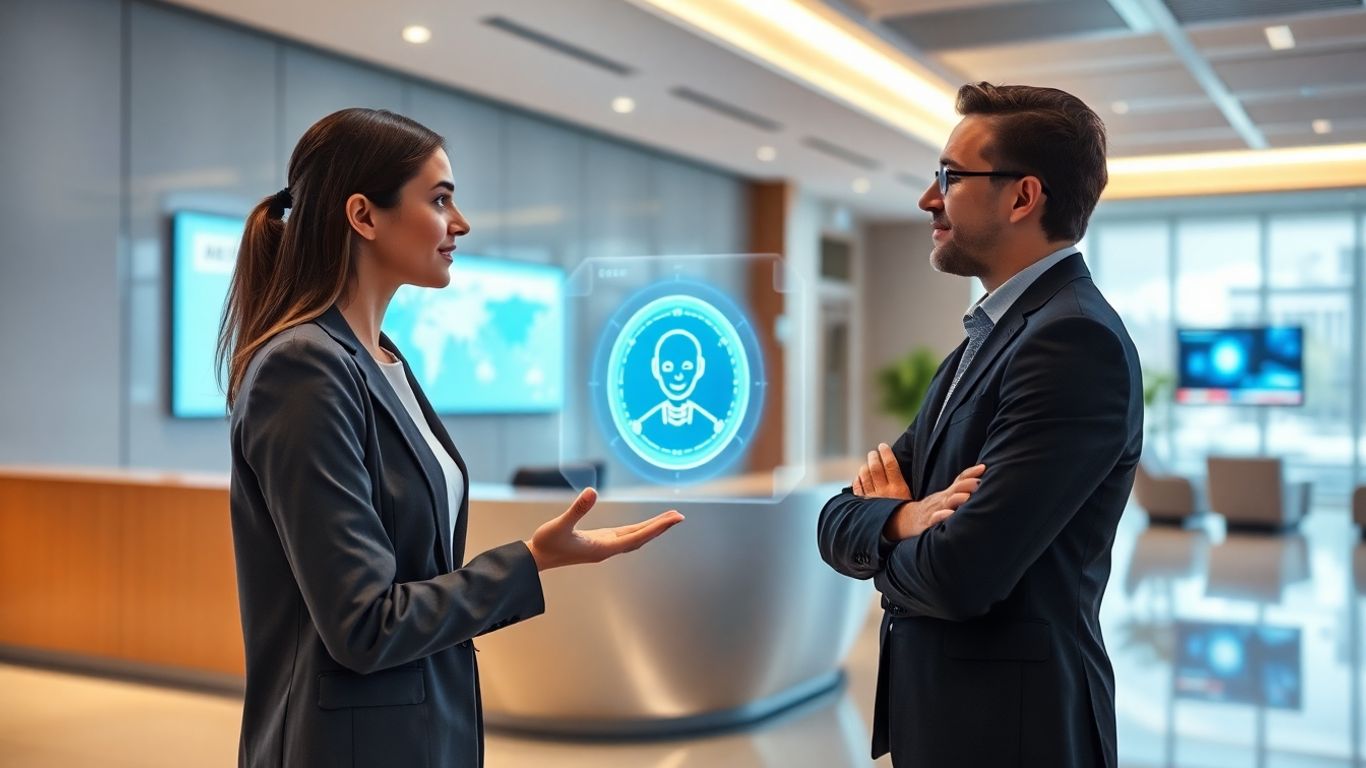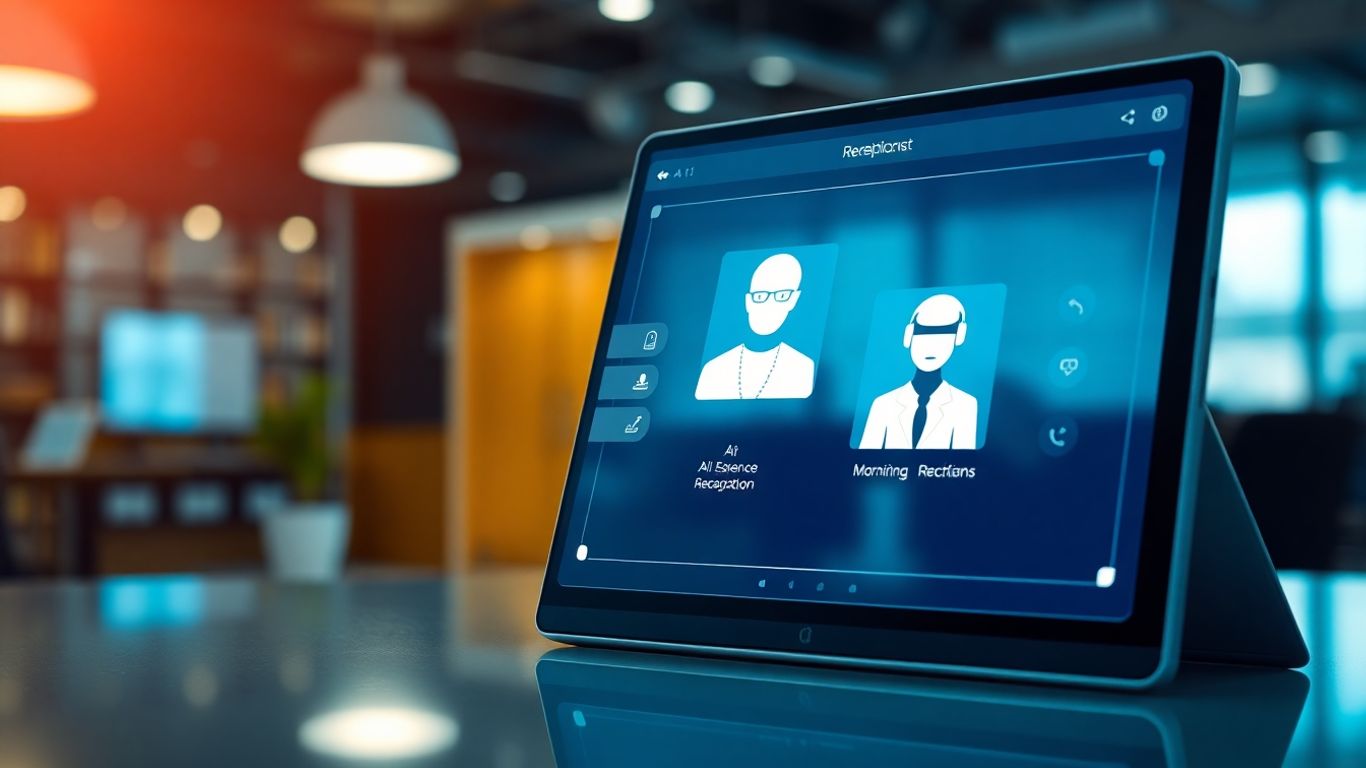Law offices are changing fast. Back in the day, you had a person answering the phone, maybe sorting mail. Now, with things moving so quickly, it's tough to keep up. Imagine your front desk handling calls, setting appointments, and taking down basic info, all day, every day. That's a lot for anyone. But what if there was a way to make that smoother, faster, and more reliable? That's where AI receptionists come in, especially for law offices in 2025. They're not just a fancy gadget; they're becoming a real help for keeping things running and making clients happy. Let's explore how an ai receptionist for law office can change things.
In the legal world, the first impression is everything, and that often starts with a phone call. For law firms, especially those looking to grow, managing incoming calls can be a real challenge. You want to be available, but you also need your legal pros focused on actual legal work, not just answering phones. This is where AI receptionists really start to shine, changing how firms handle new client inquiries.
Think about it: potential clients aren't always looking for legal help during your standard 9-to-5. They might be stressed late at night, on a weekend, or during a holiday. Missing that call could mean losing a client to a competitor who was available. An AI receptionist changes this entirely. It's always on, ready to pick up the phone the moment it rings, no matter the hour. This means you're always accessible, showing clients you're serious about helping them, whenever they need it.
When someone calls your firm, they're often looking for immediate answers or reassurance. Waiting for a callback can feel like an eternity, especially when you're dealing with legal issues. AI receptionists respond in milliseconds. They can greet callers professionally, gather basic information, and even answer frequently asked questions. This speed is key to keeping potential clients engaged and preventing them from looking elsewhere.
The ability of AI to respond instantly and consistently removes a major point of friction in the client journey. It signals professionalism and attentiveness right from the first interaction.
Getting the right information upfront is crucial for a productive first meeting. An AI receptionist can be programmed to ask specific qualifying questions. It can collect details about the client's situation, the type of legal matter, and contact information. This structured approach ensures that your legal team receives a well-prepared summary before they even speak to the client. It cuts down on repetitive questions and allows lawyers to jump straight into discussing legal strategy, making that initial consultation much more effective.
Law firms today are often swamped with tasks that don't directly involve legal strategy or client counsel. Think about the sheer volume of administrative work: scheduling appointments, answering repetitive questions, and initial client data collection. It's a constant drain on time and resources. AI receptionists are stepping in to automate these routine duties, freeing up your valuable legal professionals.
AI tools are incredibly good at handling the repetitive, time-consuming jobs that nobody really wants to do. Things like answering common client questions, sending out appointment reminders, or even initial data entry can all be managed by an AI. This means your human staff can focus on more complex issues that require a personal touch and critical thinking. It's like having an extra pair of hands, but without the coffee breaks or the need for HR.
Automating these tasks doesn't just save time; it also reduces the chance of human error and ensures a consistent experience for every caller. It's about making the day-to-day grind more manageable.
When lawyers and paralegals aren't bogged down by administrative duties, they can dedicate more time to what truly matters: practicing law. This shift allows them to focus on complex case strategy, in-depth client consultations, and critical legal research. For instance, a firm using an AI receptionist reported a significant jump in billable hours because their staff wasn't getting caught up in front-desk duties. This means more time spent on billable work and less on tasks that don't directly generate revenue. You can explore how AI handles tasks like lead qualification to see this in action.
By automating routine tasks and allowing legal staff to concentrate on high-value work, AI receptionists contribute to a substantial increase in overall law firm productivity. This isn't just about doing more; it's about doing more of the right things. Firms can handle a greater volume of inquiries and manage cases more efficiently without needing to proportionally increase their human staff. This operational efficiency can lead to reduced costs, improved client satisfaction, and a stronger competitive position in the legal market. It's a way to work smarter, not just harder, and build a practice that’s ready for whatever comes next.

Law firms today are facing a constant push to do more with less, and that's where AI receptionists really start to shine. It's not just about having a fancy new piece of tech; it's about making real, tangible improvements to how your practice operates day-to-day. Think about it: your legal team is highly skilled, trained to handle complex cases and provide expert advice. Do you really want them bogged down with answering basic questions or scheduling routine appointments? Probably not. That's precisely the kind of work an AI receptionist can take off their plate.
One of the most immediate impacts you'll see is a significant jump in productivity. When routine administrative tasks are automated, your lawyers and paralegals can dedicate more time to billable work and critical case management. This isn't just about making people feel busier; it's about making sure their time is spent on tasks that directly contribute to client success and the firm's bottom line. Imagine your attorneys spending less time on administrative back-and-forth and more time strategizing or meeting with clients. This shift can lead to a noticeable reduction in operational overhead, especially when you consider the costs associated with full-time human receptionists, benefits, training, and office space.
Potential clients often reach out after hours or on weekends. An AI receptionist ensures that every call is answered instantly, day or night, so you never miss a lead. This round-the-clock availability demonstrates your firm's commitment to client service and provides a significant advantage over competitors who rely on traditional business hours. The AI can also be programmed to ask initial qualifying questions, gathering essential information that helps your team prioritize and prepare for incoming consultations, meaning you're not just capturing more leads, but better-qualified ones.
Your front desk is the first point of contact for most people interacting with your firm. Making that initial experience positive, efficient, and professional can really make a difference. An AI receptionist provides a consistent voice and tone for your firm, ensuring that every caller receives the same level of polite, informative, and professional interaction. This uniformity helps build trust and reinforces your firm's brand identity, regardless of who is calling or when they decide to reach out. It removes the variability that can sometimes come with human staff, offering a reliable and polished first impression every single time.

Think of your AI receptionist as a digital assistant that plays well with others. It's not meant to be a standalone gadget; its real power comes from connecting with the tools you already use every day. This isn't about replacing your current systems, but about making them work together more smoothly.
Your AI receptionist can link up with your current Customer Relationship Management (CRM) software and appointment scheduling platforms. This means when the AI gathers information from a new caller – like their name, contact details, and the reason for their call – it can automatically send that data straight into your CRM. No more manual data entry, which is a huge time saver and cuts down on mistakes. Similarly, if the AI needs to book a consultation, it can directly access your calendar and find an available slot, updating it in real-time. This keeps everything organized and ensures your legal team always has the most current client and appointment information.
This connection isn't just a one-way street. Your AI receptionist can both send information to and receive information from your other software. For example, when a new client is added to your CRM, the AI can be updated with that information. Or, if a lawyer updates a client's status in your case management system, the AI can be notified. This constant communication between systems means all your tools are in sync, providing a more complete picture of your client interactions and firm operations. It's like having a central hub where all your business information is up-to-date and accessible.
What happens after a call ends? With proper integration, a lot can happen automatically. For instance, if the AI determines a caller is a qualified lead, it could automatically trigger an email to the assigned lawyer. If a caller leaves a voicemail, the AI could create a task in your project management tool for someone to follow up. You can set up specific rules, so when certain conditions are met during or after a call, other actions are initiated without any human intervention. This automation streamlines workflows significantly, ensuring that every interaction leads to the next appropriate step in your firm's process.

Think about the last time you called a business and got a slow, robotic response. It’s pretty frustrating, right? Well, AI receptionists are built to avoid that exact problem. They can answer calls in milliseconds, which is fast enough to keep up with a normal conversation. This means no more awkward pauses or feeling like you're talking to a machine that's struggling to keep up. The AI understands what people are saying and responds right away, making the whole interaction feel smooth and natural.
It's not just about speed, though. These AI systems are also pretty smart. They use advanced language processing to figure out what people mean, even when they ask complicated questions. They've been trained on tons of conversations, so they can pick up on the details and reply in a way that makes sense for the situation. This helps avoid mix-ups and makes the caller feel like they're actually being understood. The goal is for the AI to feel less like a computer program and more like a helpful person on your team.
Ultimately, the aim is to make the AI sound as natural and helpful as possible. It's about creating interactions that feel genuinely human. When an AI can respond quickly, understand complex requests, and communicate clearly, it makes your law firm seem organized and on top of things. This consistent, fast communication builds trust right from the first contact. It’s a big step up from traditional answering services and really makes a difference in how clients perceive your practice.
The speed and intelligence of AI receptionists aren't just about fancy technology; they're about making every client interaction as smooth and effective as possible. It's about ensuring that when someone reaches out to your firm, they get a professional, helpful, and immediate response, no matter the time of day or the complexity of their initial query.

Remember when businesses used to worry about phone lines like they were made of gold? "Oh no, all our lines are busy!" they'd cry, as if Alexander Graham Bell himself had personally limited them to five calls at once. Well, we fixed that. Our AI receptionist doesn't just handle multiple calls. It handles all the calls. At once. Forever. It's like we gave it an infinite supply of ears and an attention span that would make a zen master jealous.
What makes it cool? It's scalability on steroids, consistency that would make a Swiss watch blush, and the fact that "busy signal" is now as obsolete as the floppy disk. Our AI doesn't just handle calls, it tidies them up and thanks them for sparking joy. Peak periods? More like "meh" periods. Black Friday, Super Bowl commercial just aired, zombie apocalypse? Bring it on. Your brand consistency remains intact whether it's the first call of the day or the ten thousandth.
Why should you care? Because it means happy customers, your business stays alive even when that influencer accidentally puts your phone number in their Instagram story, and you can scale without the growing pains. Imagine your product goes viral and thousands of calls pour in. Your AI doesn't break a sweat. It's like the phone equivalent of that "This is fine" meme dog, except everything actually is fine. Or when tax season hits and accountants everywhere brace for impact, your AI just yawns and asks, "Is that all you've got?" If your service goes down and angry customers flood the lines, your AI handles it so well, they hang up wondering if they should apologize to you. When you go global, your AI juggles time zones like a cosmic deity. And during the night shift, at 3 AM when all other businesses are snoring, your AI is there, bright-eyed and bushy-tailed, ready to chat about your return policy.
Your law practice has a rhythm, and your AI receptionist should too. You can actually tell the AI exactly when to work and when to take a break. This means you can set it up to cover your office hours, extend into the evenings, or even handle calls on weekends and holidays. It’s about making sure the AI is working when it’s most beneficial for your practice.
Think of it like setting a schedule for a human employee, but without the coffee breaks or the need for vacation days. You simply define the start and end times for your AI receptionist. This ensures that calls are handled during your operational hours, or extended hours if you choose, preventing missed opportunities when your office is closed.
Life isn't always a standard Monday-to-Friday, 9-to-5. Your AI receptionist can be programmed to recognize and adapt to various scenarios. This includes:
This intelligent adaptation means your firm always presents a professional and aware front, no matter the calendar date or clock time.
It's not just about when the AI answers, but how. The AI can be trained to understand the context of the time. For example, a call received late at night might trigger a different response than one received during peak business hours. It can offer to take a detailed message, schedule a callback for the next business day, or provide specific after-hours information, all based on the time the call comes in.
The AI receptionist doesn't just answer calls; it answers them appropriately, understanding that a call at 9 AM is different from a call at 9 PM, or a call on a holiday versus a regular Tuesday. This contextual awareness makes interactions feel more natural and considerate.
Sometimes, a quick text message is just what a client needs. AI receptionists can analyze the content of a call and automatically send a follow-up text. For instance, if a client calls about a specific legal matter, the AI can send a text with a link to relevant FAQs or a document explaining the next steps. This keeps clients informed without requiring immediate human intervention, making them feel looked after even when lawyers are busy. It’s a small touch that can make a big difference in how clients perceive your firm's responsiveness.
Imagine a client calls with a question, and the AI receptionist can't fully answer it but knows exactly who can. Instead of just taking a message, the AI can generate a unique link. This link can lead to a specific page on your website, a scheduling tool, or even a direct message portal for the right legal professional. The client clicks the link, and bam, they're connected or have the information they need. This makes the transition from initial contact to resolution much smoother for everyone involved. It’s about making sure that the client’s journey with your firm is as easy as possible.
We all know that managing costs is important for any law firm. With AI receptionists, you don't have to worry about runaway expenses. You can set a cap on how many minutes the AI can be active within a given day, week, or month. This gives you predictable costs and stops unexpected bills from popping up. If the AI hits its limit, it can automatically switch to voicemail or forward calls to a human team member. It’s a smart way to balance having an always-on assistant with keeping your budget in check. This feature is great for firms that want to test the waters with AI or manage costs during slower periods.
Controlling AI usage isn't just about saving money; it's about smart resource management. It ensures that your AI assistant is available when you need it most, without overspending during quieter times. This flexibility allows you to tailor the AI's availability to your firm's specific needs and financial plans.
It's pretty clear that the way we handle front-desk tasks is changing, and fast. For law firms, this means AI receptionists aren't just a cool new gadget; they're quickly becoming a standard part of how successful practices operate. Think about it: the legal world is always looking for ways to be more efficient and provide better service. AI receptionists fit right into that. They're not here to replace people entirely, but to work alongside them, handling the repetitive stuff so lawyers and paralegals can focus on the actual legal work.
In today's market, if you're not using technology to your advantage, you're probably falling behind. For law firms, this means clients expect quick responses and professional service, no matter when they reach out. An AI receptionist can answer calls 24/7, gather initial information, and even schedule appointments. This kind of constant availability is becoming less of a perk and more of an expectation. Firms that don't offer this level of access might find potential clients going elsewhere, simply because another firm was easier to reach.
The legal landscape is evolving, and technology is at the forefront of this transformation. Embracing AI for client-facing roles like reception is no longer a luxury, but a strategic move to stay competitive and meet modern client expectations.
What we see now with AI receptionists is just the beginning. The technology is improving all the time. We're talking about AI that can understand more complex questions, handle more nuanced conversations, and integrate even more deeply with your existing legal software. Firms that start adopting AI now will be in a much better position to adapt as these advancements roll out. It's about building a foundation for future growth and staying ahead of the curve.
It's not about AI taking over; it's about AI making human professionals better at their jobs. An AI receptionist can handle the initial intake, freeing up your legal staff to prepare for client meetings with all the necessary information already gathered. This means less time spent on administrative tasks and more time for actual legal strategy and client interaction. The goal is to use AI to amplify the skills of your legal team, not to replace them. Think of it as giving your lawyers and paralegals a super-powered assistant that handles the busywork, allowing them to concentrate on what they do best: practicing law.
The idea of receptionists being replaced by smart computer programs is here! These AI helpers can answer phones, book meetings, and answer questions all day long. It's like having a super-efficient assistant that never sleeps. Want to see how this technology can help your business? Visit our website to learn more and try it out!
So, there you have it. AI receptionists aren't some far-off sci-fi idea anymore; they're here, and they're making a real difference for law firms. They handle the calls, schedule the meetings, and answer the basic questions, all while your team focuses on the important legal stuff. It's about working smarter, not harder, and making sure your clients always feel heard. Embracing this tech isn't just about keeping up; it's about getting ahead and building a practice that's ready for whatever comes next. It’s a practical step towards a more efficient and client-friendly legal future.
Think of an AI receptionist as a super-smart computer program that acts like a human receptionist for your law firm. It can answer phones, talk to people, schedule meetings, and answer common questions, all by itself, 24/7. It's like having an extra helper who never sleeps or takes a break.
It helps in many ways! It makes sure you never miss a call from a potential client, even late at night or on weekends. It also handles simple tasks like taking down basic information or setting up appointments, which frees up your lawyers and staff to focus on important legal work instead of getting stuck with routine questions.
Yes, these AI systems are really advanced! They can understand complex questions and have natural-sounding conversations, almost like talking to a real person. They learn from the information you give them about your firm to provide accurate answers.
Not at all! Most AI receptionist services are designed to be super easy to set up. You usually just need to tell the AI a bit about your business, and it can be ready to go in just a few minutes. It's much faster than hiring and training a new person.
While there's a cost, it's usually much less than hiring a full-time human receptionist. Plus, by catching more leads and making your staff more efficient, it can actually save your firm money in the long run and help you make more money.
Absolutely! Most AI receptionists can connect with your existing tools, like calendars and customer relationship management (CRM) software. This means information can flow smoothly between systems, making your whole office run better.
That's where AI really shines! An AI receptionist can handle a huge number of calls all at the same time without getting overwhelmed. Unlike a human who can only take one call, the AI can manage many conversations simultaneously, so no client feels ignored.
Yes, you have full control. You can set specific hours when you want the AI to be available. It can also understand different time zones and know not to answer calls during holidays or specific times you designate, ensuring it always responds appropriately.
Start your free trial for My AI Front Desk today, it takes minutes to setup!








